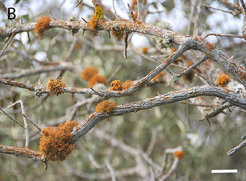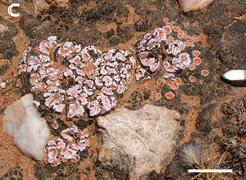Microbial surface communities and processes
Project Team PD Dr. Bettina Weber
Microbially-dominated surface communities occur on soil, rocks, and epiphytically growing on the bark and even leaves of trees. They are composed of photosynthesizers (lichens, bryophytes, algae, cyanobacteria), heterotrophic consumers (e.g., protozoa, nematodes, tardigrades, rotifers, microarthropods), and destruents (fungi, bacteria, archaea). It is our overall goal to understand and quantify the roles of these microbially-dominated surface communities under current and future conditions in the Earth system.
Key Topics:

Cryptogamic covers growing on soil, plants and rock. A) Cryptogamic rock cover: mosaic of lichens on granitic rock, Cape Point, South Africa. Scale = 5 cm.
- Relevance of microbial surface communities in global processes and nutrient cycling (C-, N-cycle, dust transport, albedo)
- Identification of microbial mechanisms and processes (C- and N-cycling mechanisms, microbial bioaerosol emissions, desert varnish, weathering processes)
- Effects of atmospheric processes and climate change on microorganisms and feedback mechanisms (global change effects on C- and N-cycle, atmospheric transport affecting distribution mechanisms and atmospheric processes)
Methods:

B) Cryptogamic plant cover: epiphytic lichens (Teloschistes capensis) at Cape Point, South Africa. Scale = 5 cm.
- Trace gas measurements (CO2, N2O, NO, HONO) in lab and field
- Molecular analyses (Illumina sequencing, NGS, Fluorescence In Situ Hybridization)
- Long-term microclimate measurements and sensor development
- Light and electron microscopy
- In-situ microsensor analyses
- Field mapping techniques
- Hyperspectral remote sensing imagery and field spectroscopy
- Global upscaling and modeling
Teaching:

C) Biological soil crust dominated by the green-algal lichen Psora decipiens, Soebatsfontein, South Africa. Scale = 5 cm. All pictures: Bettina Weber
- Interdisciplinary teaching project: Biological aerosols: Interactions between atmosphere, biosphere, climate, and health
- Molecular physiology of plants II
We regularly supervise Bachelor, Master, and PhD theses on current research topics.


